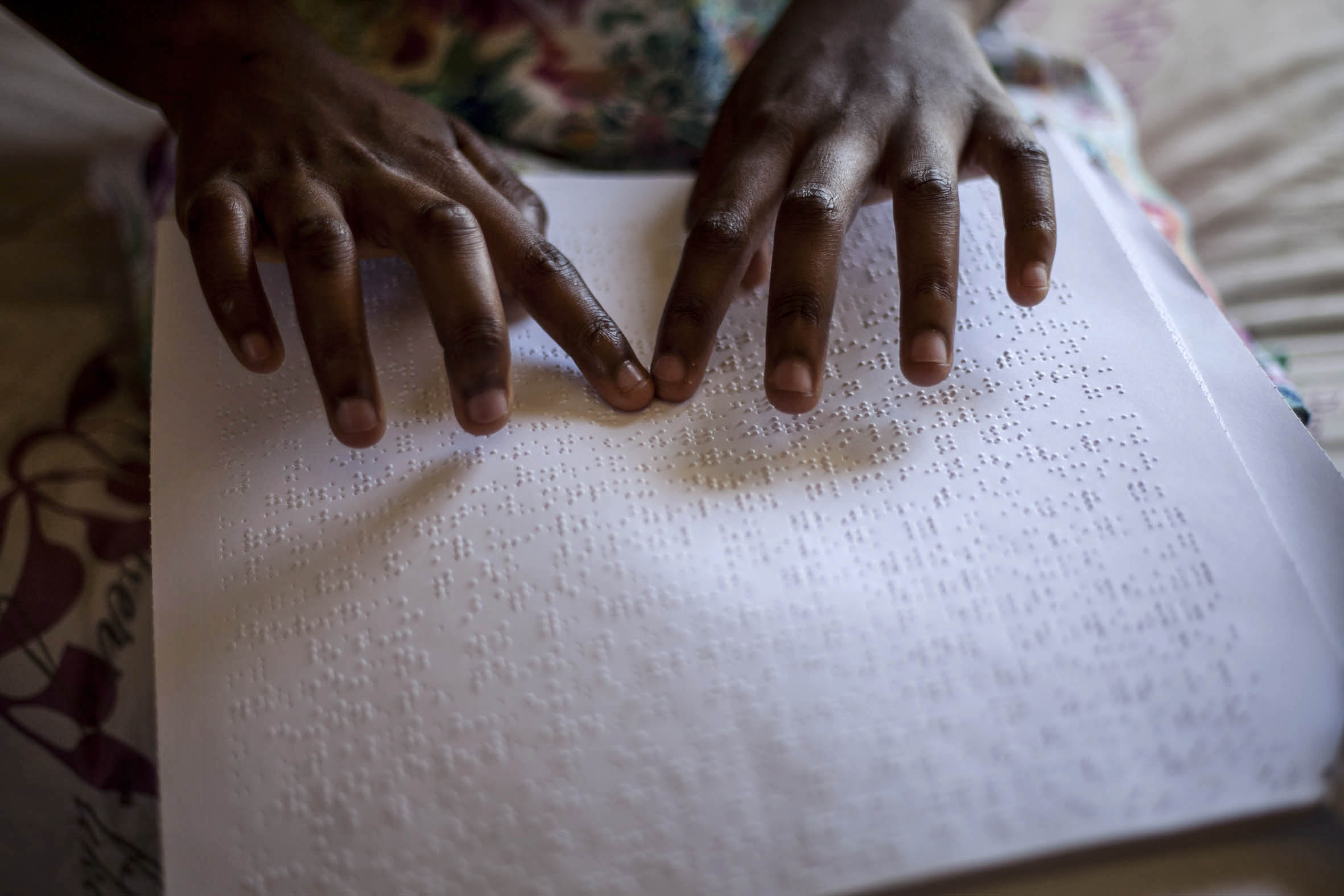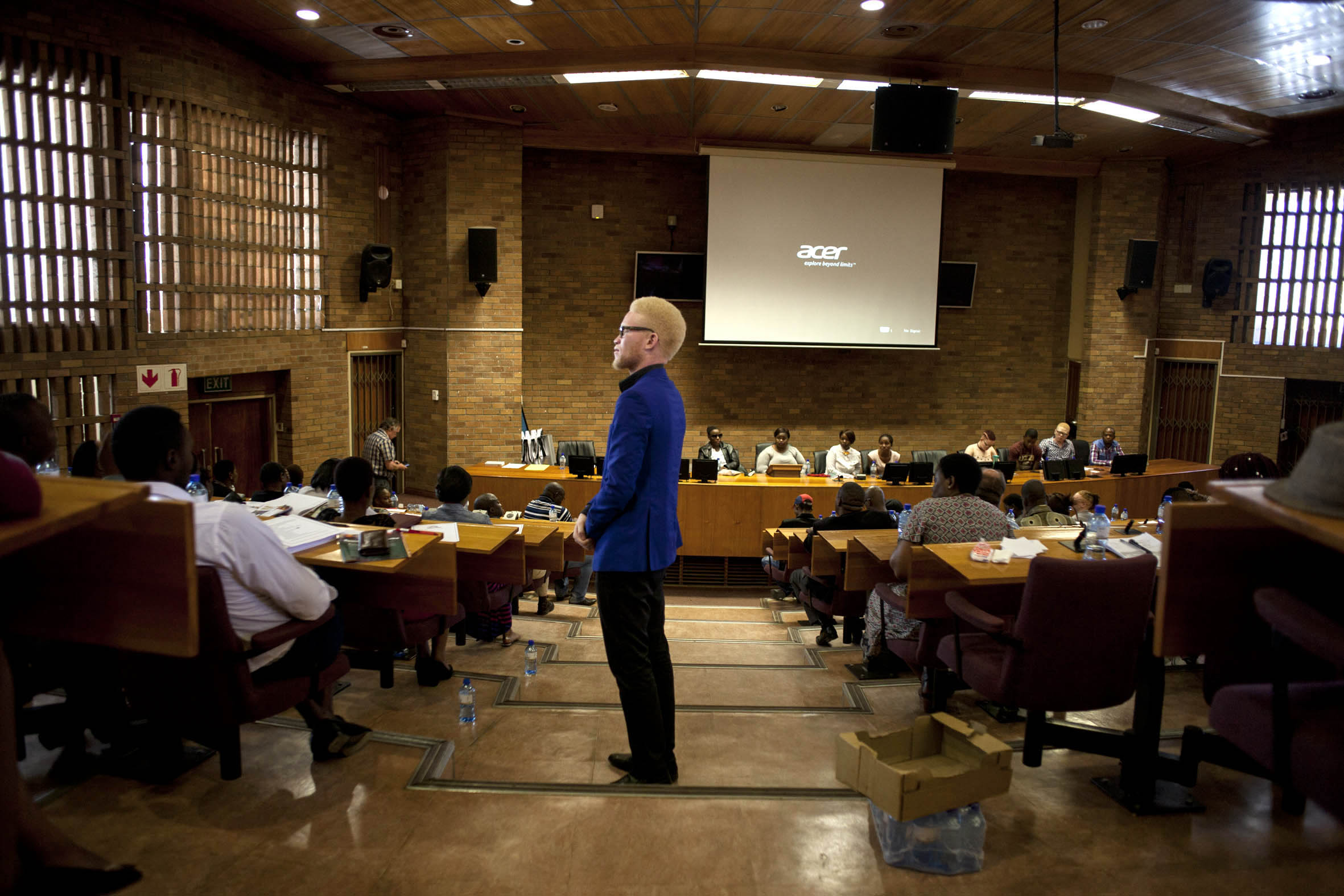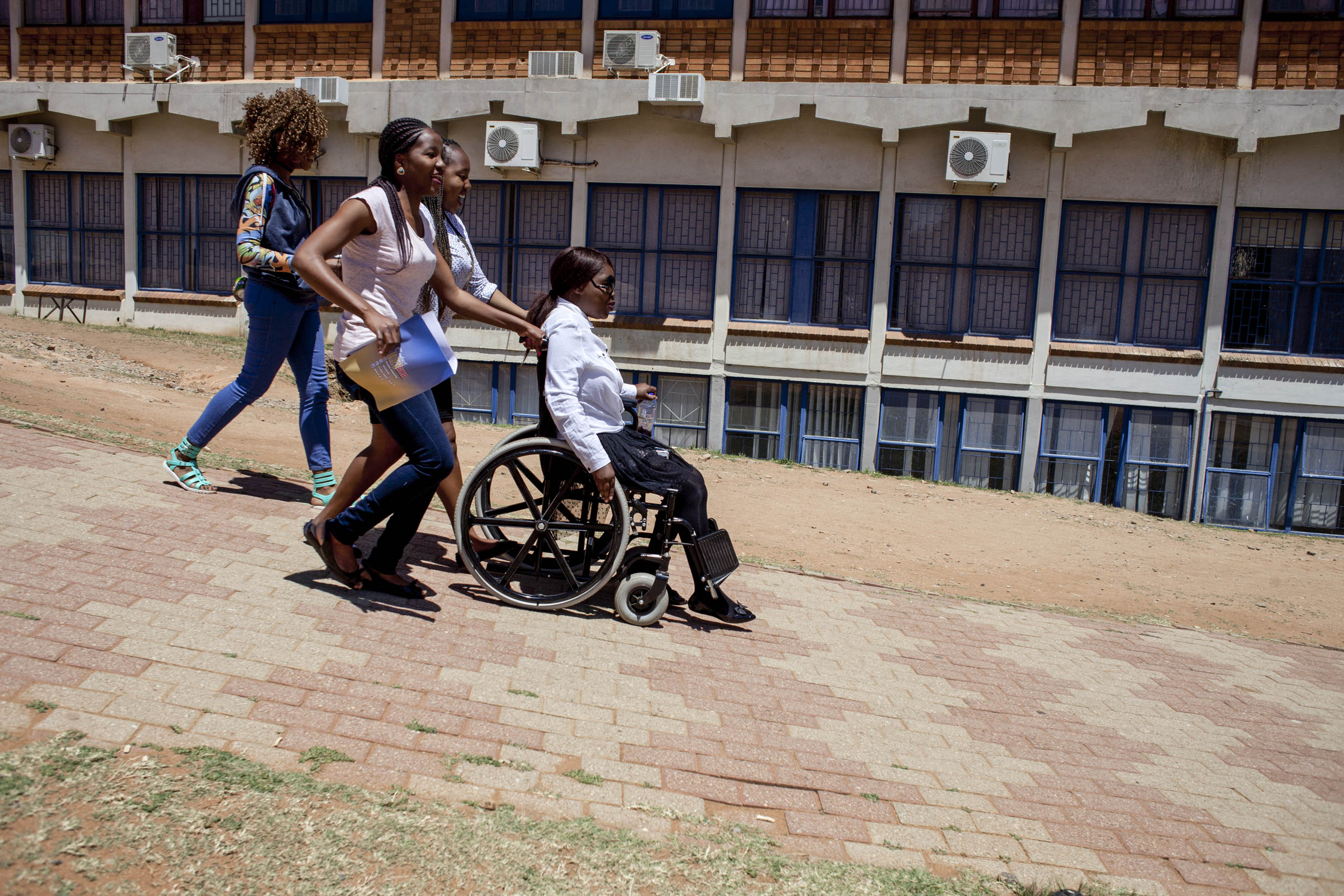Ndivhuwo Matshanisi and Alina Mofana say that the braille facilities at the university are insufficient and that classes are inaccessble.
The University of Limpopo is widely regarded as one of the best institutions of higher learning for people living with disabilities. Its specially designed Disabled Students Unit is meant to provide “appropriate support services to empower persons with disabilities on campus and in the community through education, training and development, encouraging independence and active participation in the academic and socioeconomic world”.
But students at the university disagree, saying that, although campus facilities such as residences are tailored to their needs, the academic programme fails to accommodate them.
Blind students are particularly affected, often having to defer their assignments because they have not received their Braille notes on time. They claim the university does not have enough capacity to produce the number of Braille texts required.

[There are some braille facilities at the university but students are frustrated. (Oupa Nkosi)]
Ndivhuwo Matshanisi, from Matovha village in Venda, says the sole Braille producer employed by the university relies on a student assistant, who is sometimes unavailable because of his own academic obligations.
“We end up not having notes on time because he has not [received] help. The workload is overwhelming,” she says.
Matshanisi is a second-year bachelor of arts translation and linguistics student.
The university was not her first choice for her tertiary education but her former high school teacher encouraged her to study there and even applied on her behalf. “She told me this university is the best university in the country for people living with disability.”
But her two years at the university tells a different story. She claps her hands when speaking, as if to emphasise her point.
“I can’t say this university is the best. Remember, I’m here for my academics. I want to be a professor one day. But if I’m struggling with my academics, how can I say this university is the best? It’s not. Our aim is not to sit here in a good accommodation and to eat, but it is to excel academically.”
Matshanisi matriculated at the Filadelfia Secondary School, a special-needs school in Soshanguve, Pretoria. Her face lights up as she recounts her schooling career. She was a top achiever and all her learning needs were met.
She has not found that same level of academic support at the University of Limpopo.
“The classes are not accessible, the resources are not even enough for us, so the university is not the best at all,” she says.
According to data collected in the 2011 census, 80% of disabled people aged 20 to 24 are not pursuing a tertiary education. This is despite the fact that 7.5% of all South Africans live with a disability.
Matshanisi first enrolled for a media studies course and, although she enjoyed it, she was forced to choose another because the conditions were not conducive to her disability.
She is sitting in a dark room on her bed in the Khanya House residence, her notes scattered around her, when we meet.
“Aag, for me it does not matter whether the lights are on or off,” she chuckles. “But you can switch them on.”
She says that, as a blind person, her first contact with anyone is their voice. “I need to be familiar with your voice first before I can listen to what you are saying. It’s what I do in class as well.”
One class she attended while still registered for media studies had up to 10 lecturers in one semester.
“I struggled because the classes were big; you could easily have 900 of us in a class. People would be making noise and they [the lecturers] were not using microphones. And a person will come for one day or two days in a week and next week it’s another one. So, when I’m confused, I don’t know who should I consult.”
Matshanisi is not alone in her struggles.
Last month, a group of disabled students led by the Disability Student Organisation at the university held a protest to highlight the difficulties they encounter, which are mainly to do with the lack of resources. But it is the “ignorance” of lecturers who fail to accommodate students with disabilities that they say is the most difficult to deal with.

[Students such as William Jonga took part in a recent awareness campaign, to sensitise staff to the problems faced by students with disabilities. (Oupa Nkosi)]
This is particularly infuriating when they miss exams because a lecturer has “forgotten” about them.
Students with disabilities write their tests and exams at the disability centre, which has all the necessary equipment, such as computers with speech synthesisers for blind students.
After preparing a question paper, lecturers are meant to submit the script to the exam centre, where it is formatted in Braille and then taken to the students at the centre. But sometimes this does not happen.
“Sometimes you are supposed to write a test at 1pm and you end up waiting until 3pm at the centre and no one comes with your question paper. And when you confront the lecturer, they will simply say: ‘Ah, I forgot you are writing at the DSU [Disabled Students Unit]. I forgot to submit your question paper,’” Matshanisi says.
“Some of them will even be rude to you when you confront them [with the fact] that you did not write.
“They behave as if it’s your fault, but I was there on time to write and I even reminded them to do the question paper. Some of them don’t admit that they are wrong. They will tell us: ‘You are not serious; you don’t take your work seriously and you’re going to fail.’ Who must fail when it’s their fault? It hurts. It’s painful,” she says.
But sometimes other problems crop up, such as Braille tests that are riddled with errors, which is a result of employees at the exam centre not being trained in Braille, she says.
“When you confront the people at the exam centre about the mistakes, they will just say: ‘Ah, there is nothing we can do. Go talk to your lecturer’ — and your lecturer would think that you want free marks,” she says.
Matshanisi is also dependent on the help of friends. The speech synthesiser programme on her laptop does not correct spelling mistakes, so she has to enlist the help of a friend to edit her work.
“In September, I wanted to submit my English assignment and, obviously, because I can’t edit for myself, I asked one of my friends to edit for me. I thought she loved me and instead she introduced mistakes in my assignment. So it’s painful; we have challenges even when doing our assignments.”
It’s even worse for mother-tongue modules such as Tshivenda because the programme does not recognise the language at all.
“I just write and sometimes I don’t even get someone to edit for me. So obviously the lecturer, when marking, will see the spelling mistakes but there is nothing I can do.”
The chairperson of the Disability Student Organisation, Sthembiso Mthiyane, says it’s problems like these that led to the protest last month.
“We had to fight for our rights. Issues relating to disabilities had been ignored,” she said last week.
She was speaking during a disability awareness campaign organised by the organisation in an effort to expose lecturers to the challenges students with disabilities face and to show lecturers how they can be more empathetic.
She told the lecturers that she receives complaints from blind students and, as a student herself, she often does not know how to help them.
“They will come to me and tell me that in class lecturers do not consider them and while teaching they like saying: ‘As you can see’ — and they don’t see. When you are teaching and you keep on saying ‘as you can see’, what do you expect a blind student to see?” she said.
She said students in wheelchairs sometimes cannot even consult lecturers because lifts are not working and they can’t reach the lecturers’ offices.

[University of Limpopo student Precious Ralefeta has suffered from osteoarthritis since she was 17, affecting her mobility. She has to use a wheelchair when she travels long distances, but it’s not easy to get around campus when the lifts aren’t working. (Oupa Nkosi)]
“You go to the administrator and say: ‘Can you tell prof so-and-so that I’m here; can they come and attend to me?’ They throw tantrums and don’t want to attend to students,” Mthiyane said.
“When this university got recognised as the number one institution catering for students with disabilities, it meant that everything is at its best level and that is what we expect — the best. We will not be apologetic about our issues,” she said.
Many other students shared their experiences during the awareness campaign and described how some lecturers are not at all helpful.
“Stop ignoring us,” was Mahlatse Mampuru’s appeal to the lecturers. He lost his eyesight when he was 14. He is a sports fanatic.
“If I were to choose between being here and sport, I would choose sport [rather] than being here. In sport, the commentators, even though I cannot see, they give me the full information about what is happening on the field.
“In 2010, when Siphiwe Tshabalala scored that beautiful goal [during the Fifa World Cup], I experienced that moment the same time it happened and not after.
“But here you go to the class, the lecturer uses a projector and you cannot see, and they start saying this and that and you cannot see what they are talking about. So for me, being here sometimes is just useless,” he told those gathered in a lecture hall.
Students also bemoaned the fact that some lecturers refuse to help them and “diagnose” them and say they are not disabled because their disability is not visible.
One such as student is Sphesihle Khoza. She had a stroke when she was a baby and cannot use her left limbs. Her feet do not have sensation.
“I can’t even do simple things. I can’t even stretch my arms. Even when I have to take fingerprints, I struggle to take fingerprints with my left hand because it is not working … and just because people see me smiling, they say I’m joking when I say I’m disabled.”
She said because she can only use one hand she struggles to type assignments and it takes her longer to finish them because her arm gets tired. “It’s so painful when I have to explain that I’m disabled and I can’t finish some of the things in time. I’m pleading, reach [out] to us,” she said.
Partially sighted student Nomfundo Nkosi, who is also living with albinism, said her life was easy until she came to the University of Limpopo.
“You go to class and you are expected to be in class every single day, and here is a projector and you are sitting in front and you see zero. The font is small, you see nothing and you are expected [to succeed]. I used to not go in class in my first year, because I did not see any reason to go to class because I could not see on the board. I decided that I will just study on my own,” she said.
She shared the story of an incident when a lecturer used a small chalkboard to draw graphs and, when she informed the lecturer that she and a friend could not see them, the lecturer said she was lying.
“She refused to understand and we were in tears, literally in tears. And my other friend even stopped attending that class,” Nkosi said.
Some of the lecturers who attended the awareness campaign said the session was an eye-opener and they would start being more sensitive to the students’ needs.
Most said their knowledge of disabled students’ requirements and issues was limited.
“It is true that we do not have knowledge, partly we accept that what we have been doing,” said a lecturer. “But there were also presentations that showed that sometimes we are limited in understanding your needs and your issues … It hurts us when we realise how much damage we have caused.”
The University of Limpopo failed to respond to repeated requests for comment.